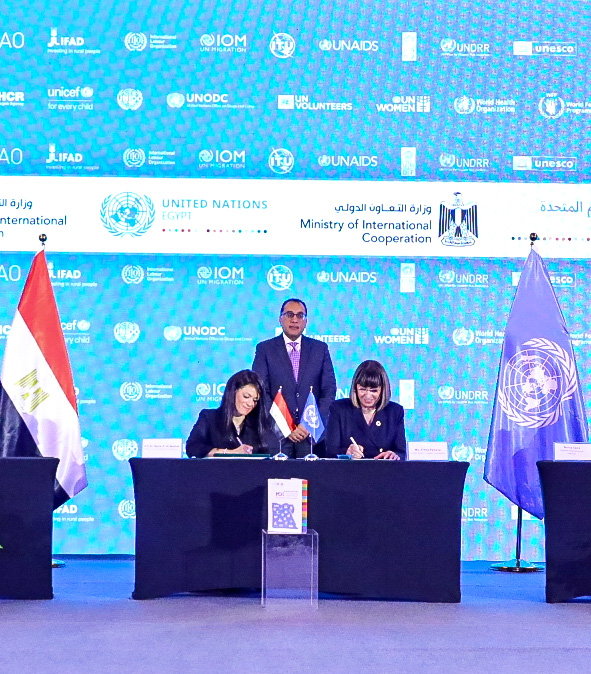
5 Steps to Build an Effective CSR Strategy
In today’s business landscape, Corporate Social Responsibility (CSR) has evolved from being a “nice-to-have” to ...

Dr. Rania Mashat, Minister of International Cooperation, and Elena Panova, the United Nations Resident Coordinator in Egypt, have signed the Egypt -UNSDCF 2023 – 2027, along with representatives of the UN agencies and programs, in the presence of Dr. Mostafa Madbouly, Prime Minister of Egypt, many ministers and representatives of international financing institutions, the private sector, civil society, the House of Representatives and the Senate, and relevant entities.
The UNSDCF is the tool for planning and implementing cooperation programs between Egypt and the United Nations system in the country from 2023 to 2027, in line with Egypt Vision 2030 and national sectoral strategies, the cooperation framework for sustainable development strategy in Egypt, and the priorities reflected in the framework of major policies and initiatives, as well as international covenants related to human rights.
This framework was drafted in close coordination with the Egyptian government – represented by the Ministry of International Cooperation – according to a participatory and comprehensive process with all stakeholders and the UN. Over the course of nearly two years, more than 40 national partners from ministries, concerned entities and specialized bodies participated, as well as 28 international partners from UN agencies and programs, representatives of the private sector, multilateral and bilateral development partners, civil society, unions and trade unions, academic institutions and the private sector.
The preparation period began in May 2021, and over the course of two years, many discussion sessions, workshops, and high-level ministerial meetings were held to present the results of the joint analysis, monitor the priorities of the two sectors, include the observations of the partner authorities concerned, and review the framework until reaching a final version that reflects the goals desired and national priorities.
During the preparation period for the new framework, a joint country analysis of the status of the Egyptian economy and national priorities was implemented. The analysis included more than 100 national, regional and international documents, action plans and strategies in order to reach accurate results that reflect the needs of the current stage and the priorities of the country’s economy. In light of the partnership, it is expected that by the year 2027, progress will be made in achieving the national development goals compatible with the sustainable development goals through four strategic priorities; namely quality services for all as well as social cohesion and an enhanced youth and child focused human capital, inclusive competition, diversified, environmentally sustainable and knowledge economy in addition to sustainable natural resource management for food security and climate resilience, and transparency, good governance and rule of law.
By taking advantage of the ability of the UN system to bring together various relevant parties and provide advice in drawing up development policy programmes, promoting international best practices and advocating leaving no one behind, the government and the UN are set to work to address the main challenges and risks of acceleration the pace of achieving the goals of sustainable development. Therefore, the cooperation framework will have five results that contribute to achieving strategic priorities.
The cooperation framework aims to enhance human capital by 2027 through equal access to quality services and ensuring comprehensive social protection and justice.
The framework also seeks to promote environmentally sustainable, inclusive and people-centered economic development driven by industrial transformation and productivity growth, decent job creation, digitization and integration of the informal economy.
Under the Egypt-UNSDCF framework, resilience to climate change will be enhanced by 2027 as well as climate and efficient management of natural resources for all in a sustainable environment.
The cooperation framework also aims that people have improved access to safe and equal opportunities to access information, enjoy protection and justice, and within a peaceful and inclusive society according to a transparent, efficient, effective and participatory and question-based governance framework. It is based on the rule of law and international rules and standards.
It also seeks enhancing the access of women and girls to their rights, as stipulated in the Egyptian constitution, as well as social, health and living rights, in addition to ensuring their empowerment and their assumption of leadership positions in a society free from all forms of discrimination and violence against women and girls.
اترك تعليقا